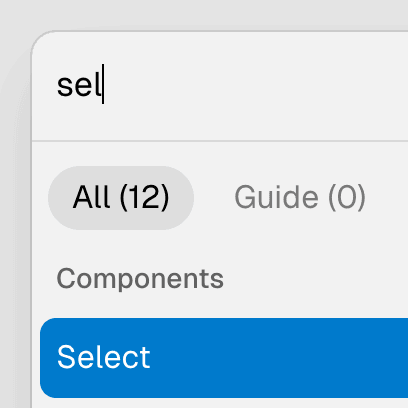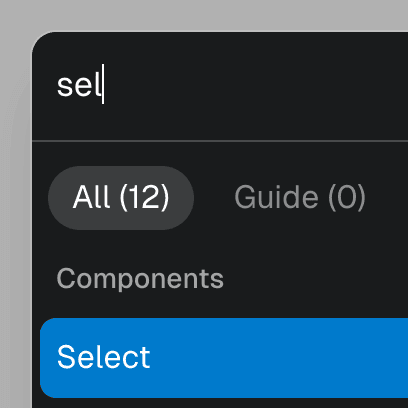useFormStore
Creates a form store to control the state of Form components.
Code examples
email: "",
},
});
Optional Props
defaultErrors
DeepPartial<DeepMap<T, ErrorMessage>> | undefined
The default errors of the form.
defaultItems
T[] | undefined = []
The defaut value for the
items state.
defaultTouched
DeepPartial<DeepMap<T, boolean>> | undefined
The default touched state of the form.
defaultValues
T | undefined = {}
The default values of the form.
errors
DeepPartial<DeepMap<T, ErrorMessage>>
Form errors.
items
T[]
Lists all items along with their metadata. This state is automatically
updated when an item is registered or unregistered using the
registerItem
function.
Live examples
setErrors
((errors: DeepPartial<DeepMap<T, ErrorMessage>>) => void) | undefined
Function that will be called when the
errors state
changes.
Code examples
setItems
BivariantCallback<(items: T[]) => void> | undefined
A callback that gets called when the
items state
changes.
Code examples
const [items, setItems] = useState([]);
setTouched
((touched: DeepPartial<DeepMap<T, boolean>>) => void) | undefined
Function that will be called when the
touched state
changes.
Code examples
setValues
((values: T) => void) | undefined
Function that will be called when
values state
changes.
Code examples
function MyForm({ values, onChange }) {
}
store
Store<Partial<S>> | undefined
Another store object that will be kept in sync with the original store.
Live examples
touched
DeepPartial<DeepMap<T, boolean>>
The touched state of the form.
values
T = {}
Form values.
Live examples
Return Props
useValue
<T = any>(name: StringLike) => T
A custom hook that rerenders the component when the value of the given
field changes. It accepts a string or a reference to a field name from the
names object in the
store, for type safety. It returns the value of the field.
Live examples
Code examples
const nameValue = store.useValue("name");
// Can also use store.names for type safety.
const emailValue = store.useValue(store.names.email);
useValidate
(callback: FormStoreCallback<FormStoreState<T>>) => void
Custom hook that accepts a callback that will be used to validate the form
when validate is
called, typically when a form field is touched or when the form is
submitted.
Live examples
Code examples
store.useValidate(async (state) => {
const errors = await api.validate(state.values);
if (errors) {
store.setErrors(errors);
}
});
useSubmit
(callback: FormStoreCallback<FormStoreState<T>>) => void
Custom hook that accepts a callback that will be used to submit the form
when submit is
called.
Live examples
Code examples
store.useSubmit(async (state) => {
try {
await api.submit(state.values);
} catch (errors) {
store.setErrors(errors);
}
});
names
Names<T>
An object containing the names of the form fields for type safety.
Live examples
Code examples
store.names.name; // "name"
store.names.name.first; // "name.first"
store.names.name.last; // "name.last"
setValues
SetState<T>
Sets the values
state.
Code examples
store.setValues({ name: "John" });
store.setValues((values) => ({ ...values, name: "John" }));
getValue
<T = any>(name: StringLike) => T
Retrieves a field value.
Live examples
Code examples
const nameValue = store.getValue("name");
// Can also use store.names for type-safety.
const emailValue = store.getValue(store.names.email);
setValue
<T>(name: StringLike, value: SetStateAction<T>) => void
Sets a field value.
Live examples
Code examples
store.setValue("name", "John");
store.setValue("name", (value) => value + " Doe");
// Can also use store.names for type-safety.
store.setValue(store.names.name, "John");
pushValue
<T>(name: StringLike, value: T) => void
Pushes a value to an array field.
Code examples
store.pushValue("tags", "new tag");
store.pushValue("tags", { id: 1, name: "new tag" });
// Can also use store.names for type-safety.
store.pushValue(store.names.tags, "new tag");
removeValue
(name: StringLike, index: number) => void
Removes a value from an array field.
Code examples
store.removeValue("tags", 0);
store.removeValue("tags", 1);
// Can also use store.names for type-safety.
store.removeValue(store.names.tags, 0);
setErrors
SetState<DeepPartial<DeepMap<T, ErrorMessage>>>
Sets the errors
state.
Code examples
store.setErrors({ name: "Name is required" });
store.setErrors((errors) => ({ ...errors, name: "Name is required" }));
getError
(name: StringLike) => ErrorMessage
Retrieves a field error.
Code examples
const nameError = store.getError("name");
// Can also use store.names for type-safety.
const emailError = store.getError(store.names.email);
setError
(name: StringLike, error: SetStateAction<ErrorMessage>) => void
Sets a field error.
Live examples
Code examples
store.setError("name", "Name is required");
store.setError("name", (error) => error + "!");
// Can also use store.names for type-safety.
store.setError(store.names.name, "Name is required");
setTouched
SetState<DeepPartial<DeepMap<T, boolean>>>
Sets the touched
state.
Code examples
store.setTouched({ name: true });
store.setTouched((touched) => ({ ...touched, name: true }));
getFieldTouched
(name: StringLike) => boolean
Retrieves a field touched state.
Code examples
const nameTouched = store.getFieldTouched("name");
// Can also use store.names for type-safety.
const emailTouched = store.getFieldTouched(store.names.email);
setFieldTouched
(name: StringLike, value: SetStateAction<boolean>) => void
Sets a field touched state.
Code examples
store.setFieldTouched("name", true);
store.setFieldTouched("name", (value) => !value);
// Can also use store.names for type-safety.
store.setFieldTouched(store.names.name, true);
onValidate
(callback: FormStoreCallback<FormStoreState<T>>) => () => void
Function that accepts a callback that will be used to validate the form
when validate is
called. It returns a cleanup function that will remove the callback.
Code examples
const cleanup = store.onValidate(async (state) => {
const errors = await api.validate(state.values);
if (errors) {
store.setErrors(errors);
}
});
onSubmit
(callback: FormStoreCallback<FormStoreState<T>>) => () => void
Function that accepts a callback that will be used to submit the form when
submit is called.
It returns a cleanup function that will remove the callback.
Code examples
const cleanup = store.onSubmit(async (state) => {
try {
await api.submit(state.values);
} catch (errors) {
store.setErrors(errors);
}
});
validate
() => Promise<boolean>
Validates the form.
Code examples
if (await store.validate()) {
// Form is valid.
}
submit
() => Promise<boolean>
Submits the form. This also triggers validation.
Code examples
if (await form.submit()) {
// Form is submitted.
}
reset
() => void
Resets the form to its default values.
registerItem
BivariantCallback<(item: T) => () => void>
Registers an item in the collection. This function returns a cleanup function that unregisters the item.
Code examples
const unregisterItem = store.registerItem({ id: "item-1" });
// on cleanup
unregisterItem();
renderItem
BivariantCallback<(item: T) => () => void>
Renders an item in the collection. This function returns a cleanup function that unmounts the item.
Code examples
const unrenderItem = store.renderItem({ id: "item-1" });
// on cleanup
unrenderItem();
item
(id: string | null | undefined) => T | null
Gets an item by its id.
Live examples
Code examples
const item = store.item("item-1");
getState
() => S
Returns the current store state.
setState
<K extends keyof S>(key: K, value: SetStateAction<S[K]>) => void
Sets a state value.
useState
useStateUseState<StoreState<T>>
Deprecated: Use
useStoreState instead.
Re-renders the component when the state changes and returns the current state.

